So you want to… run a care farm?
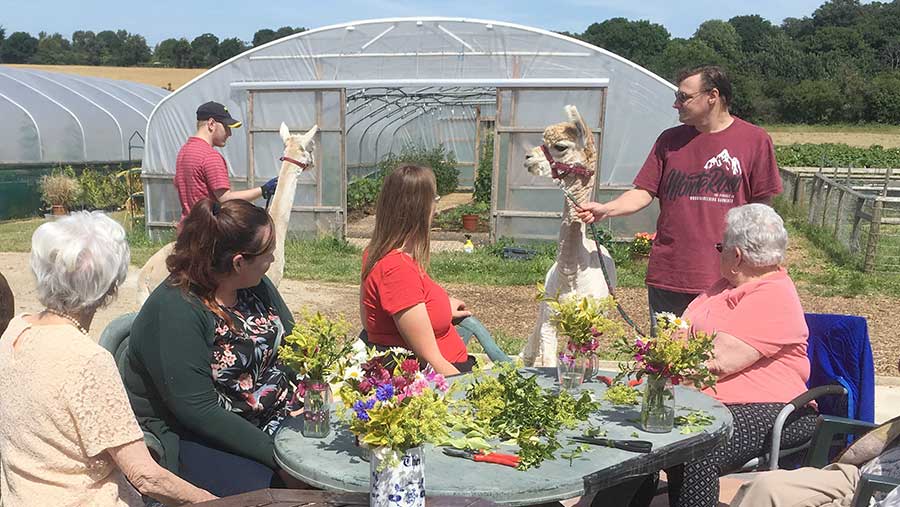
© Social Farms & Gardens
Accessing an agricultural holding on a regular basis can help a wide range of people with a vulnerability improve their health and wellbeing and build social skills.
It’s an opportunity that Social Farms & Gardens (formed by the merger of the Federation of City Farms and Community Gardens and Care Farming UK) wants everyone to be able to access, but it won’t suit every farming business.
Dr Rachel Bragg, the charity’s care farming development manager, explains what anyone considering running a similar enterprise needs to know.
See also: So you want to … grow and sell Christmas trees?
What is care farming?
Care farming is the use of agricultural practices to improve mental and physical health, social skills or education.
Some are based on commercial farms, while others are more like smallholdings. Clients can get involved in as much or as little as the provider deems appropriate, such as feeding and cleaning out livestock, harvesting crops, or running a box scheme.
“The individual comes first and the activities must be tailored around them,” says Dr Bragg. “There is no such thing as a typical care farm, because it’s so varied.”
Benefits of care farming
- Mental and physical health benefits of being outside in nature
- Meaningful activity – being useful, and working on jobs that need doing in a real business environment, rather than just being kept out of trouble
- Rehabilitation into society for some users – no longer isolated
- Development of social skills such as working in a team, independence and personal responsibility
- Family members get a break or get to meet others in their situation and socialise
- Aims to reduce strain on statutory services and the NHS
- Alternative use for farm
What is the UK market like?
According to the most recent survey (run by Care Farming UK in 2016), there are 250 care farms in the UK, of which more than 200 are in England.
On average, the sites cater for five different user types, with 35 clients attending one to three times a week.
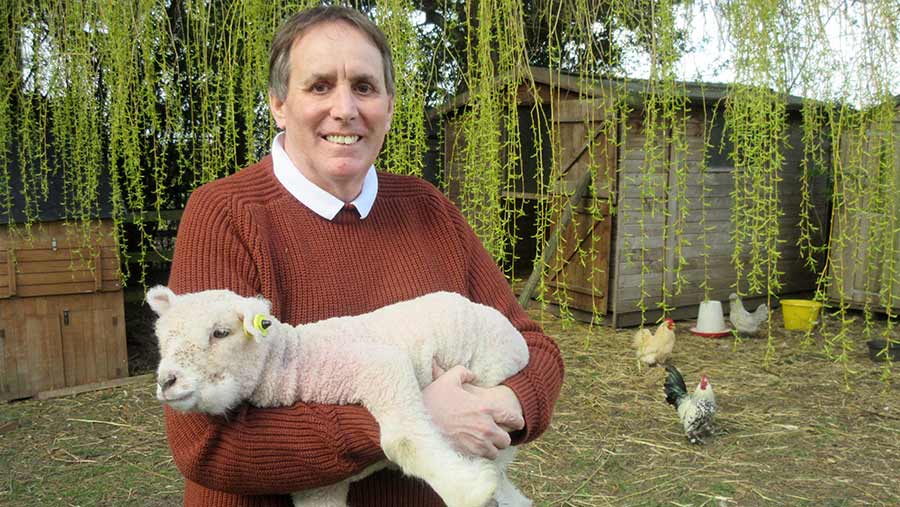
© Social Farms & Gardens
The average cost of a care farming session (typically between 10am and 3pm) is £52, though this can vary hugely and depends on session length, the client’s level of ability and their degree of care.
Many care farm providers also host school visits, generally on separate days.
User types
Clients are generally referred by health and social care professionals (local authority social services; GPs; community mental health teams) and educational commissioners, and include:
- Children with special educational needs
- People with dementia
- Students excluded from school
- Ex-service personnel with post-traumatic stress disorder
- People with mental ill health
- People on the autism spectrum
- People rehabilitating from drug or alcohol addiction
“Some user groups would need to be kept apart – for example, anyone with an issue with excess noise can’t be put with a more exuberant group,” Dr Bragg says.
“Businesses range from those hosting one to two days, with farming being the main income stream, to others that mainly care farm, with less emphasis on commercial production.”
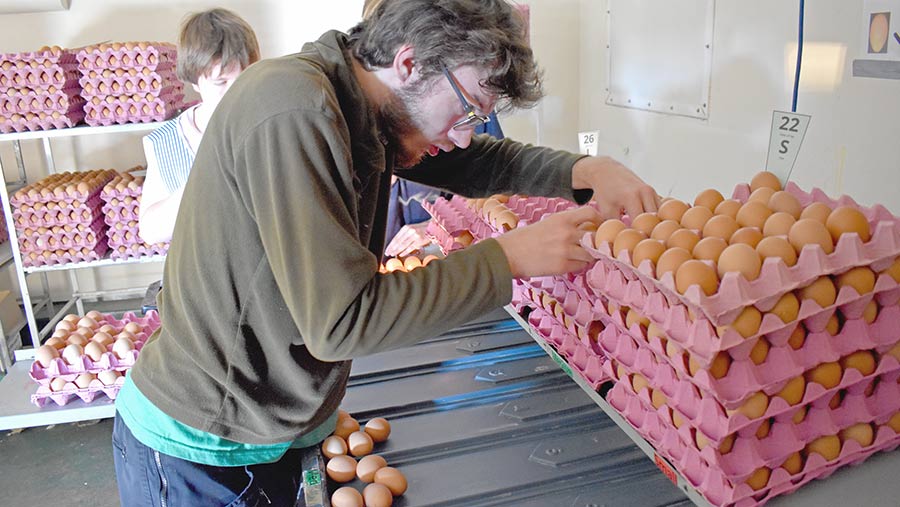
© Social Farms & Gardens
What do you need to start a care farm?
Land, some sort of shelter, somewhere to sit down, hand-washing facilities and toilets are the basic requirements. Anything else is a bonus, says Dr Bragg.
Ideally the site should not be too remote, and as transport can be an issue, some farmers pick up their clients in a minibus.
“Allowing the users to help may mean some jobs take much longer, like moving sheep from one field to another,” says Dr Bragg. “You need a back-up plan to ensure the animals are fed and the farm is running properly, so you might have a farm manager as well as a care service provider.”
Safeguarding and risk assessment practices must be carried out for the activities, and these are particularly important because of the clients’ vulnerabilities.
Being an expert in special needs or health and social care is not necessary, as these skills could be filled by family members, volunteers or staff, such as specialist nurses.
“Care farming isn’t appropriate for everyone,” says Dr Bragg. “It’s not a massive money-making scheme, so they need to enjoy having people on their farm and have a motivation for doing it and an altruistic nature.”
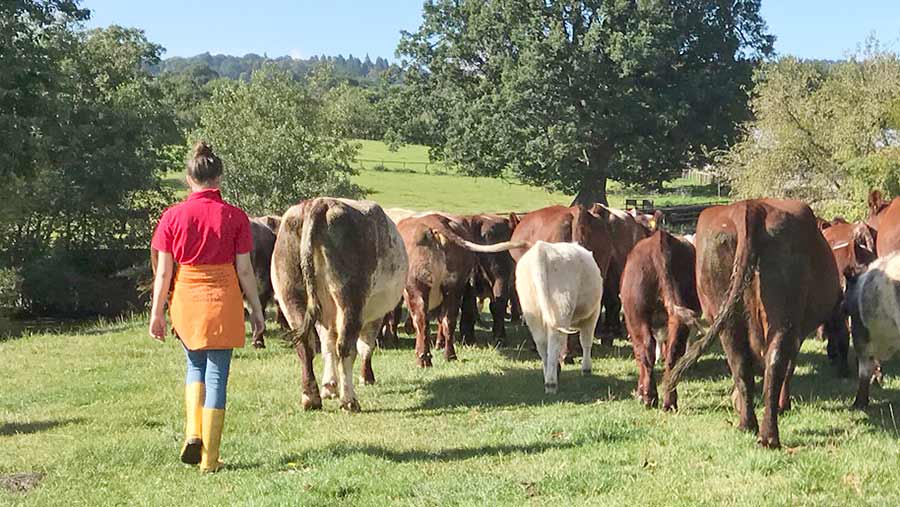
© Social Farms & Gardens
What about funding?
Generally, sessions are funded by the individual client, local authorities, charitable trust donations, local companies’ corporate social responsibility payments, or educational access payments as part of Higher Level Stewardship schemes.
Other options include lottery funding, crowdfunding or Rural Development Programme for England Leader grants.
National Park sustainable development funds, European social fund community grants, and the Development Bank of Wales (if based in Wales) may also be able to help, according to Social Farms & Gardens.
The association has launched the £1.4m Growing Care Farming project in partnership with Thrive this year, which aims to increase the number of care farm places available across England to 1.3m.
The scheme is supported by Defra, funded by the Department of Education and managed by Natural England.
What should you take professional advice on?
- Legal factors
- Tax implications
- Insurance cover
- Disclosure and Barring Service checks
Where can more information be found?
Social Farms & Gardens has created a code of practice, which it encourages all those providing care farming services to adopt.
It covers safeguarding, risk assessment, health and safety, staff recruitment, farming activities, and evaluation, and is available for a fee on its website.
The association also plans to deliver training from early 2020.
The Countryside Educational Visits Accreditation Scheme (Cevas) is a nationally recognised accreditation that offers training for working with children or clients with additional needs. The therapeutic route is geared to the needs of care farmers.
Further details are available on the Cevas website
Case study: Edfords Care Farm, Upper Wood Farm, Mautby Estate
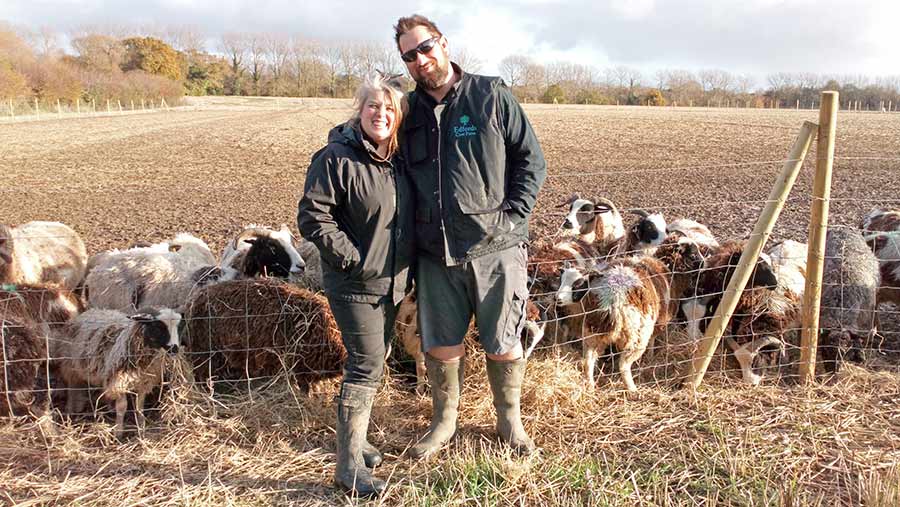
Chris and Louise Bishop-Howes © Norfolk County Council
Chris and Louise Bishop-Howes provide adults and children with the opportunity to work with rare-breed livestock, grow fruit and vegetables and learn a host of new skills within agriculture.
They have recently moved to Upper Wood Farm on a 10-year farm business tenancy with Norfolk Council, having outgrown their old site.
Farm facts
• Edfords Care Farm, Upper Wood Farm, Mautby Estate
• 34ha
• 10-year farm business tenancy with Norfolk County Council
• Used to be arable holding, but now being converted to care farm
• Livestock: Pedigree pigs and sheep
• Clients: Long-term residential care home users; school visits; teenagers and young adults
Previously an arable unit, the couple is in the process of converting it into a care farm, as well as already welcoming new and existing clients.
Starting out
Mr Bishop-Howes had a career in marketing until 2008, when he was signed off work. He found working on an allotment helped his mental health improve, and he bought some chickens so he had to go every day.
“The benefits were clear, so we took on a tenancy of a farmhouse with one acre of land and took on some larger livestock,” he said.
“Once we had established a smallholding, we looked for a way to extend it and share my therapy with others.”
In 2013, the pair applied for a county farm and got to the interview stage, but were unsuccessful. Having created a business plan and researched the market as part of this process, they decided to start offering care farm services anyway, albeit on a smaller scale.
Initially focusing on long-term residential care users, they contacted the local homes, leafleted and advertised their services before running a series of open days in May 2014 with just a tent, tarpaulin, cakes and thermoses.
“We started as a small petting farm, grooming goats, feeding chickens, collecting eggs, cleaning out animals, a vegetable garden and building bird and bat boxes,” said Mr Bishop-Howes.
“Five months later, a special educational needs school contacted us and started bringing them in once a week, which was when we realised we had more than one string to our bow.”
Future plans
Edfords Care Farm moved to the Mautby Estate in October, and the couple have plenty of plans for taking advantage of the larger holding.
They currently have eight Gloucester Old Spot and three Large Black pigs, about 50 Jacobs and a small breeding group of Gotland sheep.
The new year will see the arrival of some Norfolk Horn sheep, as well as cattle – probably Red Poll and Highland.
Mr Bishop-Howes is setting up a conservation area near a pond to benefit both the wildlife and the clients seeking a quiet, calm spot.
“We’re looking to convert the farm to organic status over the next two years, as it suits our way of farming,” he said.
“We will also be mob-grazing our sheep and cattle and intend to join the Pasture for Life programme, so our animals are only fed organic pasture from our farm.”
The care farm business has links with social care services, foster homes and schools, and its sessions are paid for by the local authority or privately.
It is currently waiting for funding to set up an education programme, having applied for the Local Investment in Future Talent project – EU funding via the council.
Part of the funding will go towards training to delivering Asdan, a scheme offering 16- to 26-year-olds the opportunity to achieve qualifications at the farm and find paths into employment, such as apprenticeships.
“We want to do something substantial for the future of young people – giving them a second chance when school doesn’t work out for them – that leads on to the future of agriculture as well,” said Mr Bishop-Howes.
Q&A
What do you enjoy about it?
I still get to work with livestock every day and get the reward of watching others build their confidence on the farm and become accomplished at the wide variety of tasks involved.
What is most challenging about it?
We’re farming, though on a small scale, with people who need supporting. It has been suggested to us that we have a free workforce, but there is so much more to it than that.
We’re teaching skills and encouraging them to complete tasks, and this can mean you soon get behind with other jobs that need doing.
What attributes do care farmers need?
An understanding of farming is essential. As first-generation farmers, we achieved this by running a smallholding for a few years before we became a care farm.
A passion for working with people and helping them achieve their goals through agriculture is essential, as is the awareness of what it takes to run a farm 365 days a year.
If you’re running a care farm to get rich, you’re in it for the wrong reasons.
What advice would you give to others setting up a care farm?
Research everything – it isn’t just farming or just day care. How you set up the business is essential.
Our view is that all care farms should be not-for-profit organisations, because the majority of our income is from social care and education budgets.
These areas need to be protected because they look after people. By becoming a community interest company or a charity, the work you do with people goes back to looking after people.
